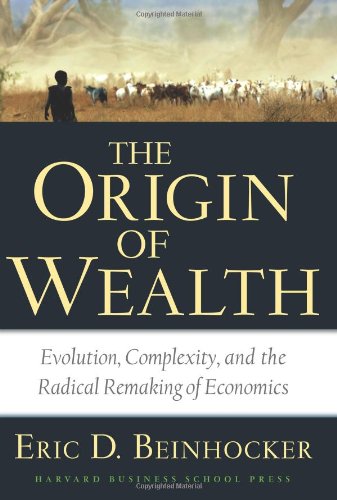(Ebook) The Origin of Wealth: Evolution, Complexity, and the Radical Remaking of Economics by Eric D. Beinhocker ISBN 9781578517770, 157851777X
Eric D. Beinhocker's "The Origin of Wealth" critiques a neoclassical economics and presents a new school of economic thought called "Complexity Economics". The book starts off by presenting the history of economic thinking and the rise of the neoclassical paradigm - the current dominating economic methodology that uses complex mathematical models and assumes perfect rationality, equilibrium, etc. Beinhocker critiques Neoclassicism for some of the reasons that I heavily disagree with it-it involves too much math, assumes perfect rationality, and relies on faulty economic constructs (equilibrium is an example). In short, the theories of Neoclassicism are not in one respect consonant with reality. However, after he critiques Neoclassicism he begins a very long, long, long explanation of his complexity economics. Most of the following chapters are descriptions of "complexity economics" and how while mainstream mathematical formulas are erroneous, his computer lab scenarios provide insight into how humans behave.In my opinion he seems to make the same mistakes that he accuses Neoclassicism of doing, using complex formulas and computerized equations as data for human action and how they behave. He simply provides a new perspective but doesn't really build on it because in reality it requires a vast pile of mathematical research and more outlandish computer models that haven't been concocted yet. He even seem to support Keynesian economics, a school of thought that can be considered as mainstream as mainstream comes, as representing some business cycle theory of complexity economics because it takes into account entrepreneurial expectations (To his credit, he still critiques it because he says they still rely on perfect equilibrium). In short, it appears as if his critique of neoclassical economics is more with the fact that they base their fancy models on 19th century physics, not 20th century physics. (I believe he states this earlier in his book, although he ties it into his "new approach" and does not say it in such a critical way). His analysis of business structure is a little bit better. He talks about market competition and how dynamic, capitalistic and innovative companies will survive but if they fail then a new and better company will supplant them. He provides evidence that markets are in fact always changing, giving examples of companies that have started as small businesses, evolved into large ones, and then declined into shadows of their former self. Unfortunately he makes mistakes in his final chapters, such as where shuns the free market and supports antitrust. In his last chapter he supports a great deal of government intervention which in fact hampers the dynamic creative destruction he supports (I'm not going to go in detail with them as they don't really deal with the book itself, but I will talk to someone if they want). In summation, he doesn't really provide a consistent theory for Complexity Economics. To his credit,he admits that he is really starting a new trend and is providing the framework for a change in economics. In my opinion though, just like Neoclassism, he is building the framework on a shaky foundation and doesn't combine his theories into coherent thought.
*Free conversion of into popular formats such as PDF, DOCX, DOC, AZW, EPUB, and MOBI after payment.


